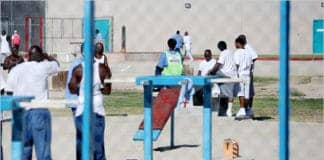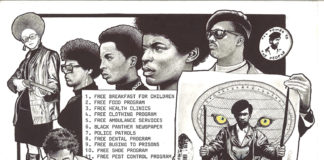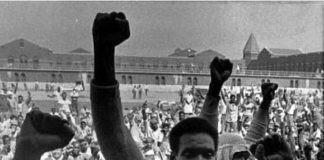Tags Prison industrial complex
Tag: prison industrial complex
Jovanka will bring people power from Richmond to the California Assembly
Two-term Richmond City Councilperson Jovanka is a leading contender for the open California State Assembly District 15 seat being contested by a dozen candidates. Jovanka wants “power to change the laws, to change oppressive, corrupt and racist policies … Politics impacts everything … We have to put ourselves at the table. If you’re not at the table, you’re probably on the menu.” She wants your vote and your support June 5 (and again in November) so she can take your causes to Sacramento.
This ‘modern-day’ slavery isn’t all that modern
Today as I write this article I am sitting in one of Alabama’s prisons looking around at the many lost, confused and content slaves who occupy the overcrowded slave quarters called Alabama Department of Corrections. The task that I, Brother Ra Sun and Kinetic Justice have before us is to convince these brothers on today’s modern day plantations; they are still slaves, made applicable by the 13th Amendment of the United States Constitution, and are contributing to their enslavement. Unfortunately, I’ve yet to find the best way to do that.
The life of a revolutionary soldier entails sacrifice and solidarity
The continual corruption and oppression here at Maryland’s Eastern Correctional Institution has reached monumental proportions. The unprecedented abuses and utter disregard for the health, safety and humanity of the prisoner population by this fascist administration further illustrates the dire conditions men and women nationwide face daily within this prison industrial complex. Make no mistake about it, corruption breeds impunity and vice versa.
Erasing the line: The organic link between the struggles of the...
One of the most important ways that a tiny 0.01 percent of the population controls all of society is through its police, military and prisons. These are some of the fascist institutions within capitalism that, through its control of mass media, can shape and mold how the contradictions between the capitalist class and working class are viewed. These views never expose the truth about how capitalism is a predatory system that has to be destroyed entirely if the working class is to prevail.
The right words can help tear down the prison system
I am a prison abolitionist in my heart. But I’m a prison reformist in the world by virtue of the sad fact that I can’t yet imagine a working society without prisons. I’ve spent every birthday since my 13th in an institution, so I’ve seen only prisons, heard only “prisons.” I want to abolish prisons; I just don’t have the imagination. Part of my failure is a lack of language to describe such a world convincingly. Likewise, a barrier we face trying to dismantle the prison industrial complex is we continue to use the language that helped build it.
An introduction to the Peoples Prison Defense Committee
I’ve been actively working on the blueprint and inner working of a nonprofit, The Peoples Prison Defense Committee, which will be a wing of or in partnership with George Jackson University. PPDC is a grassroots non-profit organization whose primary mission is rooted in prison and parole oversight. Through information, direction, providing of resources and community awareness and engagement, the committee seeks to bridge the gap between the community and the prison.
‘13th’ and the culture of surplus punishment
Ava DuVernay undertook the documentary “13th” in order to explore and bring attention to the Prison Industrial Complex. The film’s title refers to the 1865 amendment to the U.S. Constitution, in which slavery was abolished “except as a punishment for crime whereof the party shall have been duly convicted.” The story told by “13th” thus goes back to the early chain-gangs of Black prisoners – men arrested for petty offenses under the post-Civil War Black Codes who were then contracted out to perform labor that they had previously performed as privately-owned slaves.
Get ready! The Millions for Prisoners Human Rights March on Washington...
Good morning and welcome to Wanda’s Picks, a Black arts and culture program with the African Sister’s Media Network. We are joined in the studio by Robert King, Albert Woodfox and Malik Rahim. Welcome to the show. Today we are going to be talking about the Millions for Prisoners Human Rights March on Washington. We can talk about solitary confinement, political prisoners, the 13th Amendment. We can talk about what the need is for having such an event.
Defending sanctuary and fighting for abolition: It’s our time to be...
We find ourselves in a moment with a great deal at stake. Our communities are fighting to define and create sanctuary spaces, while enduring a dangerous presidential administration that has emboldened white supremacist and xenophobic action. The Trump agenda has caused increased harassment, fear and even death. In the movement for abolition of policing, imprisonment, surveillance and the entire prison industrial complex, now is our time to be bold.
It’s a wonderful life – is it?
Have you ever seen the movie, “It’s a Wonderful Life,” starring actor Jimmy Stewart? He played George Bailey, who urged the members of the “Building and Loan” to “Stick together – don’t panic, ‘cause old man Potter is not selling – he’s buying!” With that same sense of urgency, I make a similar comparison. This isn’t Bedford Falls, nor is this a movie. This is the state of the state of California, as well as the United States of America, and our lives I’m talking about.
Prison Transportation Service, PTS of America, is hell on wheels
I would like to bring to the cognizance of the people the atrocious treatment of prisoners by a company called Prison Transportation Services of America (PTSA). This is a private company based out of Tennessee that transports prisoners being extradited across the country. The conditions in which the prisoners are transported are most arduous and inhumane with no consideration for the safety or well-being of the prisoners.
I was a slave working under the California Department of Corrections
Though few Americans know it, the exception clause in the 13th Amendment makes a person a slave when they are convicted of a crime and sent to prison. I know that former President Barack Obama, a constitutional scholar and a Black man, understands this. I applaud his efforts to address issues of mass incarceration. I understand the symbolism of his visit to a federal prison, the only American president to ever do so. These were important first steps, but there is a long road ahead.
Prison strike organizers to protest food giant Aramark
The people who organized the country’s biggest prison strike against what they call modern-day slavery have planned their next target: corporate food service giant Aramark. The $8.65 billion company is one of the country’s largest employers and serves food to more than 100 million people a year. It also provides meals for more than 500 correctional facilities across the country and has been the subject of complaints about maggots and rocks, sexual harassment, drug trafficking and other employee misconduct.
Decarcerate Louisiana for sustainable economies
We are freedom fighters incarcerated at Angola State Prison and are moving to build our organization Decarcerate Louisiana. We’re advocating for community reinvestment. We believe in sustainable economies and strong local communities. Decarcerate Louisiana is organizing to redress injustice and to battle against systemic racism, classism, inequality, oppression, repression, criminalization and mass incarceration in our communities.
Sista’s Place: How KHSU’s radio station helped bridge the gap between...
Sharon Fennell, also well known by her disc jockey name Sista Soul, has been a Humboldt resident for over 30 years. Fennell, through her volunteer work at KHSU, has grown to become an advocate for prisoners and shown faithfulness in bringing awareness to the conditions and contradictions of America’s penal system. After 36 years, Fenell – or Sista as she is called by friends and close acquaintances – has decided to move on. She has one more radio show this Sunday, Dec. 18.
Prison strikes’ financial impact in California
Sept. 9, 2016, was the start of the largest prison strike in U.S. history. Over 72,000 incarcerated workers in 22 states refused to provide their labor to profit the prison industrial complex. California forces 5,588 incarcerated workers to labor in exchange for little or no compensation. Another 4,000 earn $2 a day fighting Californian wildfires with inadequate training and equipment. The prison system in California reaped $207 million in revenue and $58 million in profit from forced labor in 2014-15.
Why we’re about to see the largest prison strike in history
On Sept. 9, a series of coordinated work stoppages and hunger strikes will take place at prisons across the country. Organized by a coalition of prisoner rights, labor and racial justice groups, the strikes will include prisoners from at least 20 states – making this the largest effort to organize incarcerated people in U.S. history. The actions will represent a powerful, long-awaited blow against the status quo in what has become the most incarcerated nation on earth.
Forcing out two women’s prison wardens is scapegoating, not accountability
On the surface, the recent “retirement” of the wardens from two of California’s women’s facilities appears to be a needed move in an effort to reform California’s violent correctional system. While many Californians are just beginning to agree that our Department of Corrections does more harm than good, many legal advocates and anti-prison activists have been fighting to make that very point from both inside and out of prison for years.
The key or the peephole: A look inside the prison industrial...
The Ashker decision was great, the five core demands are all good, but how come we are not writing our own regulations and attacking the “STG” scheme in totality? We know from its inception it was designed to isolate and entrap prisoners with the God given talent to awaken the prisoner class to the exploits of the system and provide those willing to organize for change with practical alternatives to prison enslavement.
My first Black August
My name is Jonelle, and I’m an Afrikan wombman living in amerikkka. I’m an active member of Guerrilla Mainframe, which is a grassroots organization based in Dallas, Texas, and an administrative assistant to George Jackson University. Last year was my first year getting involved with Black August, and I learned a lot about the resistance of the prison movement.























